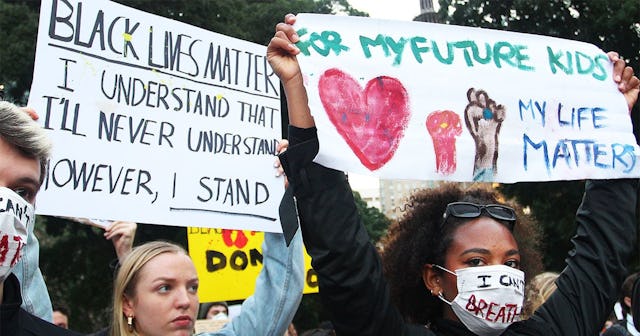Reading One Bestselling Book Doesn't Make You Anti-Racist Or A White Ally

Most of my white friends are waking up to anti-racism now, particularly after the video of George Floyd’s murder went viral. Don’t get me wrong. I’m thankful for their newfound enthusiasm and commitment. They’re reading books like I’m Still Here: Black Dignity In a World Made for Whiteness and How to be An Antiracist. They’re listening to the New York Times 1619 podcast. Some have been posting articles about activism, police brutality, and that they absolutely believe that Black Lives Matter. Their evolution has been beautiful and encouraging. They’re learning about white privilege, systemic racism, and microaggressions.
However, simply reading a few anti-racism books and sharing viral articles on social media isn’t enough. White people need to keep doing the work of allyship, taking their activism beyond sticking their noses in books.
My anti-racism education has followed an atypical timeline. My husband and I did read several books and articles, as well as had important conversations, prior to adopting transracially over a decade ago. However, the vast majority of our race education came from experience. We saw first-hand what being a multiracial family meant, especially how the clash of whiteness and Blackness made others feel. Some of these “others” weren’t afraid to bombard us with questions or render an unsolicited opinion about race in America. We received one of two responses from strangers. The first was discomfort steeped in ignorance and racism. The other was tokenism.
Allyship is desperately needed. Until white people come alongside Black people and fight as one against systemic racism, nothing is going to change. What is allyship, though? How does it manifest in everyday life?
Let’s be clear what allyship isn’t. Allyship is not listening to Beyonce, pretending to be colorblind, or being extra nice to Black people. Allyship isn’t reading To Kill a Mockingbird or watching a movie like The Help or The Blind Side and then thinking you’re woke. Resources written by and centering whiteness are not ally-friendly. They do more harm than good. Cultural appropriation also isn’t the way to go. Please don’t try to put your white daughter’s hair in cornrows. For the love of God, do not try to relate to a Black person by joking that you’re getting your summer tan on and will soon be as dark as they are.
Also, yes, you can have a Black partner, child, friend, neighbor, or co-worker and still have some serious work to do. You don’t get a ticket out of accountability because you know a Black person or even live with one. Allies aren’t users.
Allyship is also not plucking up a popular anti-racism book, reading it cover to cover, and then placing it on your bookshelf while you go about your best life. Again, I appreciate your effort. I truly believe that every little bit of self-education is important and can have a powerful impact. However, dabbling in anti-racism isn’t going to get the job done.
https://www.instagram.com/p/CCwzO97helr/?utm_source=ig_web_copy_link
Likewise, attending a single protest, signing one petition, or sending one email to a senator also isn’t allyship. This isn’t a “one and done” situation. Allyship is an ongoing commitment to racial equity, and it’s most effective when policies and the people in power change. There’s no checklist that makes you a good and safe white person, just in case that’s something you’re searching for.
Instead, you have to be willing to continuously be uncomfortable, learning how white supremacy manifests every day, and then work to dismantle that system. I encourage fellow white people to bloom where they are planted. For example, they can join committees in their kids’ schools, speak up at work against racists policies and practices, and have honest conversations with Black friends and family members. Allyship involves talking less and listening more. It also means putting into practice what has learned, being willing to make mistakes, and not giving up.
Pablo Blazquez Dominguez/Getty
Anti-racism manifests in our own circles. It means educating our children on how to be anti-racist, teaching them real history and not whitewashed, fluffy nonsense. It means calling out racism, even if the speaker is your favorite uncle. A person’s generation isn’t an excuse to be racist. It means carefully choosing what books, art, toys, films, and music you choose to entertain in your own home, too.
Curling up on your couch to read a book about anti-racism is a great step. There’s no true change without education and empathy. However, we don’t need anyone treating the racial equity uprising like a trend. This fight has been going on for well over four hundred years. You’re just waking up to it.
https://www.instagram.com/p/CCmAYQuJ78A/?utm_source=ig_web_copy_link
If you’re going to be a genuine and effective ally, you need to be in it for the long haul. Self-reflection, listening, learning, and changing are deeply important and do not happen overnight. If you truly care about Black people, you won’t just read a bestselling book and call it a day. Having an enlightening moment is one thing, but staying woke is another.
This article was originally published on